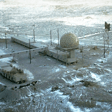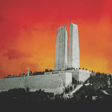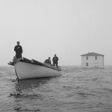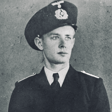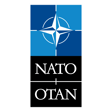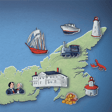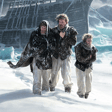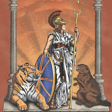Become a Creator today!Start creating today - Share your story with the world!
Start for free
00:00:00
00:00:01

Canada in the Korean War
The border between North and South Korea bristles with weapons and with mistrust. A stress point in current global tensions, the border on the 38th Parallel is a seventy-year-old legacy of the Korean War. General Wayne Eyre, Canadian Armed Forces Chief of the Defence Staff, discusses his experiences as Deputy Commander of the United Nations Command in Korea, and explains why the Korean War remains relevant today, along with Canadian War Museum historian Andrew Burtch and Kate Jaimet, senior editor of Canada's History Magazine.
Transcript
Introduction to Canada's History's Podcast
00:00:05
Speaker
Welcome to Canada's History's Stories Behind the History Podcast. I'm Kate Chaimit, Senior Editor of Canada's History Magazine, and in this podcast, we take a deeper look at some of the stories in our award-winning print publication.
Canada's Role in the Korean War
00:00:19
Speaker
The year 2023 marks the 70th anniversary of the Korean War Armistice. In our August-September issue, we feature a story about Canadian military involvement in the Korean War.
00:00:30
Speaker
To speak with me today about Canada's military role on the Korean Peninsula, both during and after the war, I'm joined by General Wayne Air. General Air is the Canadian Armed Forces Chief of the Defence Staff, and he served from 2018 to 2019 as Deputy Commander of the United Nations Command in Korea.
Korean Peninsula Post-WWII
00:00:49
Speaker
General Air, thank you for joining us.
00:00:51
Speaker
Thanks, Kate. It's great to be here. I'm actually in Korea right now as we record this podcast, so it is very poignant as we go through and discuss what happened 70 years ago. Excellent. And I'd also like to welcome Andrew Burch to the podcast. Andrew Burch is the Canadian War Museum's post-1945 historian, and he is an adjunct research professor of history at Carleton University. Andrew, welcome to the podcast.
00:01:21
Speaker
Thanks for having me on. It's a pleasure to have a chance to chat about this important chapter in Canadian military history.
00:01:28
Speaker
I'm looking forward to getting both of your insights from a historical point of view and from a military point of view. So this will be really interesting. So just to bring our readers a bit up to speed, the Korean War broke out in 1950, and that was only five years after the end of the Second World War. So Andrew, as a historian, maybe you could give us a brief overview of the situation on the Korean Peninsula at the end of the Second World War, and how did that lead up to the Korean War?
00:01:57
Speaker
Right. Well, the situation on the Korean Peninsula at the end of the Second World War really should have been cause for celebration because the Japanese Empire had collapsed as a result of the Second World War in the Pacific.
00:02:15
Speaker
And the surrender of the Japanese empire included the surrender of its territories, which it included Korea, which they had annexed in 1910. And the occupation of Korea by Japan is a very dark chapter in the long history of Korea.
00:02:36
Speaker
And the hopes on the peninsula at that time were that it would perhaps herald in a resumption of Korean independence. But really the Korean War is essentially an outcome or a result of disagreement and international politics over what that independence might look like.
00:02:57
Speaker
influenced importantly by the way in which the post-occupation was regulated by the entry of the Soviet Union into occupying the north of Korea, divided at the 38th parallel, while south of the 38th parallel, the United States had forces positioned there. And in the five years that followed, leading up to the Korean War,
00:03:24
Speaker
there were a number of discussions that were held, I will say, fruitless discussions over a peaceful reunification and independence that would have really depended on a single vision for what an independent Korea might look like.
Political Tensions Leading to War
00:03:40
Speaker
This was, of course, affected by the ongoing perceptions of Korea and its relationship to China and the Chinese Civil War, which was ongoing up until 1949.
00:03:53
Speaker
And after the Soviets declined to observe the results of like a UN commission essentially that was looking at reunification, the Americans went ahead and launched an independent election in the South that was not pursued by anything similar in the North. And so that was basically taken as a de facto proclamation of the Republic of South Korea.
00:04:22
Speaker
So they had an election in the South and elected a premier or a president. Is that correct? The Koreans did?
00:04:29
Speaker
Yeah, the president of South Korea was Sing Min-ri, who was obviously a nationalist. They were both nationalists, both leaders of North and South Korea, albeit with very different visions, and important for the Americans and very important for the future of South Korea. He was staunchly anti-communist. And the election that went ahead was really about
00:04:54
Speaker
that did solidify his power, although it was contested very heavily. There were leftist groups in South Korea who were not in favor of the election, who had opposing views. And there was a bit more of a diversity of views in South Korea than there was in North Korea, for obvious reasons, as the Soviets had basically supported Kim Il-sung, the grandfather of the present leader of North Korea, Kim Jong-un.
00:05:24
Speaker
to come to power and he was a former Red Army officer who operated in Manchuria with other Koreans who were in Manchuria as part of the Red Army and they supported him. So essentially between North and South Korea, parallel systems both emerged, both opposed to each other ideologically and ultimately militarily. And it was in part because of the unrest in the South, which was perhaps less stable in large part because of the
00:05:54
Speaker
the destabilization and the challenge, there's economic challenges and other things happening in South Korea, that it was that the North Korean leader Kim Il-sung thought and proposed to Stalin, leader of the Soviet Union, that South Korea would be a pushover, that the Americans would not defend South Korea, and that they could take Seoul in days and be able to reunify the peninsula by force and resolve that area of the early Cold War by force of arms.
00:06:24
Speaker
And when the United States and the South Koreans didn't bend as far as in break as he expected they would, that's what resulted in the following three years of war.
North Korean Invasion of South Korea
00:06:35
Speaker
So the North actually did then invade the South. Can you just sort of clarify that point? Oh, yes. So the North did invade the South on the 25th of June, 1950, after securing material support from the Soviet Union. They did so not for free. The Soviets extracted a fairly hefty
00:06:54
Speaker
loan or guarantees of loan and mineral rights and all sorts of things from North Korea to support them. And they also had tacit approval, if not full on support from the newly communist leadership of China.
00:07:09
Speaker
which gave them the security to push ahead. And in June 25, 1950, they crossed the border on the pretext that the South had started a shooting war, which of course was not true. And they very quickly had a sizable amount of success in pushing South. And it could very well have been a very different view of the peninsula had there not been rapid steps taken to
00:07:36
Speaker
hold that line that eventually emerged in the very south of the peninsula, the perimeter around Busan, which is not too far from where general air is sitting today. Okay, I'm going to put a pin in that for a second, because we'll get back to the flow of events. But on a sort of bigger level,
00:07:59
Speaker
looking back, and I don't know if General Air, if you want to put an opinion on this too, but do you think that this was a conflict between ideologies within Korea, or was it a Cold War conflict that was essentially driven by Russia and the US with their, and sort of fighting by proxy over this peninsula, or was it kind of a bit of both, or how do you see that in the big picture?
Nature of the Korean War: Civil or Proxy?
00:08:23
Speaker
The short answer is yes, that there is definitely something akin to a civil war, especially in South Korea, as there were infiltrators from North Korea. There were also domestic
00:08:38
Speaker
movements sympathetic to North Korea, the desirous of reunification, and the treatment and how those movements were suppressed is a matter of discussion now in Korea as it was then.
00:08:53
Speaker
as there was you know there were elections there were also violence surrounding those elections there was it was not necessarily a peaceful disagreement in the south and the suppression of of that discontent uh was something like a second front uh in south korea leading up to the war and in early into the war uh was it was a component of it
00:09:13
Speaker
And of course, both the forces in South Korea and the United States would paint this as clear North Korean or more likely Soviet maneuvers to secure yet another front in East Asia. And likewise, I think even to this day, the North Koreans refer to the South Korean government as a puppet government of the United States. And so everything that
00:09:37
Speaker
the South Koreans are doing is being characterized as something that is alien perhaps to their nature. And if things were regulated properly, they would be on the side of
Cultural Impact of Korean Division
00:09:49
Speaker
the North Koreans. And I think that's in part because this is a very difficult
00:09:53
Speaker
You know, culturally, it's a very difficult situation because these are our brothers and sisters of Korea who, you know, the goal is the same. I think that there was the goal of reunifying Korea after years and years, decades of occupation and suppression of the culture.
00:10:11
Speaker
the Japanese, and there was a great deal of discontent over what direction that could take that bubbled over in a variety of ways. So there was definitely the flavor of the Cold War and the
00:10:26
Speaker
greater gamesmanship, I suppose you could say, in the region was definitely a factor. But you can't discount the actual primary domestic movers, which were the local and national ambitions of those in power in both the North and the South and the movements that were sympathetic or hostile to each.
00:10:46
Speaker
I agree with Andrew, it was a bit of both. It was a case of deciding which direction the country would take and it morphed into a proxy war. But you have to remember that Kim Il Sung had a masterful ability to manipulate both
00:11:03
Speaker
China, communist China, and the Soviet Union. And he did so at the beginning of the war to get both of them to support his invasion of the South. And likewise, the US in particular and the West came to realize that this was a line in the sand against the expansion of communism. But Sengrenry as well was able to extract and influence the Western involvement in the Korean War.
00:11:30
Speaker
So this is a good segue to talk about how did Canada then get involved in this war.
00:11:36
Speaker
Well, I might start off, and by all means, General Ehr, if you want to fill in on the back end, by all means do so. The Canadian government did not have a sizable investment or even real understanding of Korea. There was no diplomatic representation in Korea. To the extent that there was, there were actually
Canada's Decision to Support UN in Korea
00:11:57
Speaker
Canadian missionaries who had
00:12:00
Speaker
had a presence in Korea through the through the occupation as well and there's actually a great deal of goodwill in regard to those those figures who even in Korea today who maintain that presence but that was the extent of our diplomatic and presence
00:12:16
Speaker
So there was not a lot of understanding or knowledge on the ground. It was kind of seen as a bit of the American's backyard in Canada. But when the invasion happened, it was an emergency. And one of the reasons why was that there was an appeal not just to the United States, but to the United Nations. And so soon after the signature of the into putting into effect the United Nations and creating the membership of which Canada was an active and
00:12:45
Speaker
and quite interested partner paired with the spirit of the time, which was seeing this as part of the larger threat of communist conquest. You have to recall that at this time, the Czech coup had taken place in Czechoslovakia, that there had been this, quote unquote, fall of China after the nationalists in that war lost.
00:13:10
Speaker
There had been the Berlin Airlift and the creation of NATO among other things. So the desire for collective action and the rationale to support the United Nations when an appeal to condemn the invasion took place was persuasive. And I think Canada as a member of the United Nations and a signatory
00:13:31
Speaker
was, I won't say eager, but did feel obliged to to respond. And that response took shape in different forms over time and with a different level of enthusiasm that depended on how dire the situation was in Korea, which it became very dire deed over the course of that summer. But the initial response was largely one of principle, which was to say that, you know, here's something that what do the Americans need? What does the United Nations need?
00:13:58
Speaker
and how can we best support our allies in the United Nations, if not necessarily Korea in its own right at that time.
00:14:07
Speaker
I think it's also important to note that this entailed a pretty significant mobilization on Canada's part because our military, after the end of the Second World War, was rapidly demobilized. It was very small. I think we had three active infantry battalions at that time. And so when Canada decided to become a part of the allied effort, the United Nations effort to save Korea,
00:14:35
Speaker
We formed what was called the Special Force, and that assembled. It was a brigade. It initially assembled and started its training in Fort Lewis, Washington. The first battalion of that brigade was sent over.
00:14:52
Speaker
It was the Second Battalion of the Princess Patricia's Canadian Late Infantry. They were lacking training. Many were Second World War veterans, but not all. And they didn't have sufficient time to acclimatize, to get ready. And consequently, when that first battalion landed in Korea, its commander, Lieutenant Colonel
00:15:13
Speaker
Jim Stone, or Big Jim, as his troops called him, told the American commander of the 8th Army Ridgeway, who was very keen that the Canadian battalion get into the fight as quickly as possible. Colonel Stone said, no, we need time to train. We want to make sure our troops are ready before we put them into the meat grinder. And at the right of the front end of Canada's involvement in the Korean War, that is a key lesson that we can take forward
00:15:40
Speaker
to today. Don't be too keen to get in the fight before you're ready. That's so interesting. And if I can just pick up a little bit on the soldiers who went over general air, because one of the things that really, I guess, touched me in a way when I started reading about this was the Second World War soldiers who you would think they had already served their country. I mean, they had already, you know, put their lives on the line, and yet there they are going again.
00:16:07
Speaker
to Korea. Were these soldiers who volunteered for this deployment or were they just they were part of the battalion so they were professional soldiers so that's where they were sent?
00:16:18
Speaker
So the first rotation, 1951 to 1952, they were raised from volunteers. They were, like I said, many Second World War veterans, but also many who missed the Second World War. They were too young, but still wanted to be part of it. So yes, they were all volunteers coming in from civilian life. It was the second rotation, 1952 to 1953,
00:16:46
Speaker
that were the professional soldiers.
Canadian Forces' Early Deployment and Battles
00:16:48
Speaker
They were the first battalions of each of our three regiments. They were already serving and already trained, but all of them were volunteers as well, because many of them had the choice. The interesting thing too about that Canadian Army Special Force
00:17:05
Speaker
which is this really core chapter of the Canadian effort in Korea, is that it in some ways is the second force to arrive, the first one being the Navy, which was deployed first. Three Canadian ships were sent immediately. Some of those were taking part in coastal activities off the coast when Douglas MacArthur was launching the landing at Incheon.
00:17:31
Speaker
They were doing screening of that invasion force. They weren't directly involved in that amphibious landing, but they were there off the coast. They were protecting other ships. They're engaging in bombardment activities, all of that. But the fact was that the situation in Korea into the summer of the Korean War, the first summer heading into the fall and before the landing in Incheon, the South Korean forces and the American forces before any major reinforcements arrived from the United Nations were embattled in this
00:18:00
Speaker
very tiny pocket of hillsides around the southernmost port of Busan. If you look at a map, it kind of looked like the North Koreans had it wrapped up. In the context of that emergency, recruit or lose Korea.
00:18:16
Speaker
the Canadians launched this crash effort in August of 1950. That was when the Canadian Army Special Force was put forward in large part to make sure that this was something specially recruited for Korea. It's not a standing commitment from the armed forces. The Canadian government had other plans for the armed forces. They were keeping an anxious eye on Europe, as well as the as General Air mentioned, there was the numbers that were available as part of the permanent force were
00:18:42
Speaker
relatively low still. So this ramping up that we see later in the Cold War had not yet happened, but this was in way kind of the start of it. And as you said, there are people who had gone back to civilian life, missed the camaraderie of the Second World War of their fellow troops or didn't have their attention held by some of the civilian jobs and
00:19:05
Speaker
resource extraction, working in lumber camps, these sorts of things. And they wanted that sense of adventure back. And quite a few people, including some of the veterans who are still with us, like in previous wars, lied about their age in order to get out and see the world. And Korea represented an adventure, a chance to go where their brothers and fathers, perhaps before them, had gone and they were just not old enough yet to join.
00:19:31
Speaker
But by the time they were trained at Fort Lewis and aboard the Joe Martinez, the troop ship that took them across, the situation on the ground by that time had changed considerably. The landing at Incheon had happened, the North Korean lines were cut, and they were in disarray. They were collapsing back towards the
00:19:52
Speaker
towards the 38th parallel and subsequently to the Chinese border. And so some speculation among the cabinet at the time that the Canadians were about to land in Busan was like, oh, well, maybe they'll just be in garrison duty and we can bring them home soon. But at that time is also when the
00:20:10
Speaker
Chinese government rather than see the North Koreans failed completely and have a hostile camp on its southern border decided to intervene massively in the war. And that's really in the context of that those first Chinese offensives is really when the Canadians start to arrive and they really get into the line after that period of training and get into the first series of UN counter offenses.
00:20:36
Speaker
that, you know, start to bring us to the equilibrium that we see when armistice negotiations begin to roll out. So, General Eyre, once the Canadians get there, can you tell us a little bit about some of the important military actions they were involved in then?
00:20:53
Speaker
So there's a number of important actions that happened before the the line stabilized. Probably the most important one or the most recognized one is the Battle of Capyong in April of 1951.
00:21:08
Speaker
where the second battalion of the Princess Patricia's Canadian Light Infantry, along with a number of other Commonwealth forces and American forces, were able to hold at Kapyong against a Chinese advance, which was pretty significant because they were moving on sole and were able to stop that Chinese advance in its tracks. But over the course of the next number of months, that battalion advanced north along with the rest of the United Nations forces.
00:21:36
Speaker
And it stopped in the area of what was called the Jamestown Line. And over the course of the rest of the war, that's where most of the Canadian experience happened. And there were a number of notable battles that happened in that location. The Battle of Hill 355 numerous times. The Battle of Hill 187 in May of 53. But this was really, in going to the experience of our troops, this was really a war of patrols.
00:22:04
Speaker
as patrols were launched on a nightly basis to move out, make contact with the enemy lines, to continue to ensure that what was called no man's land, the area between the front lines, was dominated, not allowing the enemy to have initiative. But it was a
00:22:25
Speaker
a constant stress being in those front lines, waiting for enemy attacks, sporadic and sometimes concentrated artillery, and always on your toes. And was it similar in technology to the Second World War, like tanks and fighter planes and that sort of thing, or what sort of military technology was going on there?
00:22:50
Speaker
Well, if I may, I would say that the soldier of the Second World War would have definitely recognized
00:22:57
Speaker
the equipment of the infantry platoon and mortar platoon so on in the Korean War. There was much of the same kit, although there was upgrades to winter wear and it changed a little bit over time, especially the introduction of some anti-tank weapons. The tanks that were operating, especially during the early phases were Sherman tanks, American issued, that were
00:23:22
Speaker
were issued to the Canadians armored when they arrived. And the main difference in the air being that post-Second World War had entered the jet age, and so there was a conflict in the air between MiG fighter jets that were piloted by Soviet, not Soviets. They were kind of concealing their identity a bit, but probably Soviet pilots, as well as US Air Force pilots flying in Savers,
00:23:52
Speaker
And there was an exchange program where there were a number of Canadian saber pilots who were flying with US forces and shooting down MiGs as part of the battle for air supremacy over North Korea. And it was a battle that the United Nations won. The battle over firepower, the UN always came out on top at the end in terms of their ability to deliver fire on target.
Technological Advancements in Warfare
00:24:18
Speaker
But yeah, so there was definitely a blend of the Second World War, but also heading into the Cold War and the new advancements in technology that you could see in the air. And in terms of the scales of issue and nature of issue, there was a bit more blending of old Canadian British era equipment and the beginnings of more standardization and some adoption of American equipment, official or unofficial.
00:24:45
Speaker
that were done in the lines between trades of equipment by soldiers who were sharing parts of the line with the Americans on to their left or right, in addition to being part of a Commonwealth division. So being with British and Australian and New Zealand troops, for example. So there's a bit of a
00:25:07
Speaker
cross-pollination. I think that the really interesting thing for the post-war period is that it was really a beginning of that kind of multinational cooperation and coalition operations in play. That was a bit of a continuation of what had happened during the Second World War.
00:25:24
Speaker
but also move towards a bit more coordination and shared staffs and these sorts of things that were quite important going forward in future Cold War and more modern operations. So they kind of have their roots to a certain extent in the Korean
Veterans' Stories and South Korea's Development
00:25:38
Speaker
War.
00:25:38
Speaker
So I'd like to ask both of you, General Air as a soldier and Andrew, you as a historian, during your careers, if you've had the opportunity to speak to any or many Korean War veterans and if they've told you anything about their experiences and what really stands out for you from what you've been told from the Canadian Korean War veterans that you've had a chance to meet and speak to.
00:25:59
Speaker
Well, I may start just by saying that through the course of my work at the War Museum and through, I am part of a Korean War Commemorative Committee here in Ottawa, so I have the opportunity to meet with, I have the pleasure of meeting with Korean War veterans.
00:26:15
Speaker
on a semi-regular basis. Through my work at the Museum, I've done a number of exhibitions about Canadians who served in Korea. We have an upcoming one in June that's going to carry that forward. For that, we've touched base with and worked with Korean War veterans to secure their stories as part of oral histories, as part of collecting some of the material culture that they brought back with them.
00:26:38
Speaker
And the experience of the soldier in Korea is very different depending on when they were there. It varies. There are periods of great high intensity. There are periods of watchfulness and waiting for the next offensive to come. And there are moments of personal and local tragedy. And the experience is too varied.
00:27:02
Speaker
all of them can describe with great detail the hardship of living through things like the Battle of Capyong where you had the Chinese soldiers involved in that offensive as close as 20 feet away and having to have
00:27:18
Speaker
artillery fire brought down to your own position to clear it off and to give breathing space. I've spoken to a medic who was seeing people in the flower of their youth cut down. And that stuck with him and the experience of sending down someone on the stretcher.
00:27:37
Speaker
who he knew wouldn't survive, but he just couldn't leave him on that hill. And so there's a lot of these memories that stick around and have an indelible and long-term formative impact on not just their service during that war, but for the rest of their careers if they decide to stay in the military. And the other thing I'll say, and I'm not sure if we'll have much of a chance to say about it, but the other thing is that
00:28:03
Speaker
Many years later, a fair proportion of these veterans who I've spoken to have had the opportunity to return to Korea and to see the potential that their service and their sacrifice helped to fulfill because when they went to Korea, it was an utter ruin.
00:28:22
Speaker
People were in desperate poverty. They were on the side of the roads looking for whatever sort of food and shelter they could secure. The cities and villages were pitted and mortared and bombed out. And now it's a glittering jewel of the G20 economies. It's a cultural export. And the people of Korea, to hear the veterans tell it from their encounters with veterans, with people in South Korea.
00:28:52
Speaker
is one of great gratitude. And so they see in their service, not just the horrors of it, which stays with them, but also that which their service helped to foster.
00:29:05
Speaker
And I want to really emphasize that last point that Andrew made. I've been fortunate to be able to meet with Korean veterans throughout my entire career, starting as a junior officer in the 2nd Battalion of the Princess Patricia's Canadian Light Infantry. Kapyong veterans would come in on a regular basis and regale us with their stories. But what for me is the most
00:29:29
Speaker
poignant and pointed is just that point that Andrew made about the pride that they see and I've had the opportunity to meet Korean War veterans as they've come over to Korea and I've met them here and seeing just what a vibrant dynamic society that South Korea has become it puts their sacrifice into context and so that they know it was worth it they know they made a difference and I like to use this analogy when I talk to our troops in various parts of the world
00:29:58
Speaker
and telling them that they matter. And I want them to come back in 40, 50, 60 years to see the difference that they made to the country that they're working in. That's just a really poignant point, and I'm sure being there right now and looking around makes it even more present for you.
00:30:17
Speaker
With that, I could segue into the role that you played yourself, General, because the Korean War armistice was signed 70 years ago, as we said. It resulted in a stalemate. The 38th parallel was still
00:30:31
Speaker
the dividing line between the North, which became part of the communist bloc, and then the South. So that border has always been militarized ever since. And General Air, you were there as the Deputy Commander of the United Nations Command in 2018-2019.
General Air's Experience with UN Command
00:30:47
Speaker
Can you tell us about your experiences and also maybe just give us the bigger picture of the role that the UN and Canada has played there since the end of the armistice?
00:30:57
Speaker
No, I sure will. So for me, it was a fascinating experience. I was the first non-US Deputy Commander of the United Nations Command since it was stood up in 1950. And so from that perspective, it was very much a privilege to be the one selected. The United Nations Command was the command under which all nations
00:31:23
Speaker
fought against the communist aggression in the Korean War. After the war, it was the command that oversaw the armistice agreement from the perspective of the South. And as such, underneath it, it had the United Nations Command Military Armistice Commission.
00:31:41
Speaker
Over the course of the next number of decades, as South Korea really developed and started to exercise its own sovereignty, in 1978, the combined forces command with the Republic of Korea and the US was formed.
00:31:58
Speaker
And that became the war fighting command, should hostilities break out again. And United Nations command was relegated to the background. It was still responsible for the maintenance of the armistice. And over the course of the next number of decades, it atrophied. So in about the 2014 timeframe, the US commander in theatre, who had three hats,
00:32:21
Speaker
commander of US forces Korea, commander of the combined forces command and commander of United Nations command, put in place an initiative to revitalize United Nations command. And over the next number of years, it grew. And
00:32:41
Speaker
They put an ask out if we would provide a deputy commander and Canada said yes. And so my time here was really focused on revitalizing the command revitalizing its role, its structure. It continues to be the command that monitors and it forces the
00:33:00
Speaker
the military, the armistice, but it's also the home for sending states. So states in time of conflict that provide forces to the Korean Peninsula. And so a lot of my time was focused on, you know, one, maintenance of the armistice,
00:33:18
Speaker
Two, ensuring the command was properly structured, resourced for forced tasks. And three, on exercise, practicing that role of bringing in forces from around the world to stand up and help defend the Republic of Korea again against aggression. How would you see the situation on the Korean Peninsula today? Because I think for a while, you know, when the Berlin Wall came down in 1989 and
00:33:46
Speaker
There was all the talk about the peace dividend and the Cold War was over. But now with what's going on in Ukraine, we can see the Cold War isn't really over. So how is it in Korea? What's the situation like there today?
Ongoing Political Tensions and Canada's Role
00:33:59
Speaker
So since the Berlin Wall fell, there's been numerous cycles of hope, of increased communication with the North, followed by escalations of confrontation and increased tensions. And you have to remember that the aim of North Korea, their overarching aim, is regime survival, the survival of the Kim regime. And the most existential
00:34:27
Speaker
challenge or threat that they face is not from without, it's from within. It's their own people rising up against the Kim regime. And consequently, the regime does much to keep itself isolated, to keep its population isolated, to
00:34:47
Speaker
to convince them the outside world is against them, especially the United States, especially the West and South Korea. And to them, one of the most dangerous pieces or one of the most dangerous aspects of South Korea is it's a shining example of what the Korean people can become in terms of freedom, in terms of a vibrant democracy. And so, yes, they they very much try to keep themselves isolated.
00:35:14
Speaker
And so the normalization of relations between the two Koreas is going to be very, very problematic just because of that threat that North Korea, the Kim regime sees coming from the South in terms of the ideas of freedom and the hope it could give their own population. For a dictator, the most dangerous human emotion is hope. And the regime there is very wary of it.
00:35:44
Speaker
So you don't see a path toward demilitarization of the border or normalization of relations between the two Koreas anytime soon. Well, you could say I'm a pessimist, but I would argue I'm more of a realist and given the conflicting national interests of the two, I do not see in the short term a path to normalization. All right. I'm going to quickly wrap up because we're getting short on time. I just want to ask you both, maybe the general first and then Andrew,
00:36:13
Speaker
Why is it important or is it important for Canada to continue to have a presence in Korea? And if so, what is Canada's role in Korea the way you see it? From my perspective, our role here is to help maintain that stability and security working both with United Nations Command and its subordinate element, United Nations Command Military Armistice Commission, through the provision of staff here. The importance of this
00:36:40
Speaker
this region to global stability and security and consequently our national prosperity cannot be understated. You've got three of the largest economies with the US greatly involved in this region. You've got multiple nuclear armed powers. You've got some of the largest militaries in the world.
00:37:02
Speaker
And so if conflict were to break out in this region, it would have global impact and quite significant impact on our own national prosperity. And thus, you know, doing our part to maintain that peace and stability here continues to be of great importance. And Andrew?
00:37:21
Speaker
I don't think I could add much to what the general said. There's always an interest in Canada of maintaining peace with our allies in like-minded countries. And I think that as long as there is that desire, there's a real benefit to having a presence and being present for the conversation. We certainly don't want to return to what was like at the
00:37:49
Speaker
outset of the Korean War. We really didn't have much of an eye on what was going on in Korea. We're in a much better state right now than we were at that outset in terms of knowing what's going on in the peninsula and in the region with our allies. So I think that, no, I don't have a whole lot to add there. All right. Well, we're going to wrap it up. Is there anything else, any final comments that either of you would like to make before we sign off?
00:38:14
Speaker
Well, probably, but I know the general has a heart out, so I'm not going to go on at great length. No, Kate, I'll jump in here with a couple of lessons and maybe historical analogy that we can apply to the future. One of the big lessons that I think from a military we need to take away from this conflict is the need for readiness. And we saw forces being put into the Korean War at the beginning that weren't ready
00:38:39
Speaker
They didn't have the training, the endurance forces that were allocated to other tasks, especially on the American side, from occupation duty in Japan to fighting in Korea. They were not ready for it. And so for us, ensuring that our forces are ready for conflict is
00:38:57
Speaker
front and center of my mind as we continue to build the Canadian Armed Forces of the future. The other lesson I think we can apply directly to the current situation in Ukraine with Russia's brutal war of aggression is if
00:39:16
Speaker
If the fighting were to stop tomorrow, I believe we would have a frozen conflict akin to what we have here in the Koreas, on the Korean Peninsula, and lessons in terms of how to maintain an armistice, the necessity of continuing to
00:39:35
Speaker
to ensure that the side that we support, in this case Ukraine, can thrive as a democracy, can build up to ensure that it can deter aggression from the other side. And so many, many lessons that are applicable to today's times. Lots to think about there.
00:39:54
Speaker
Thank you both for joining us. I really appreciate you taking the time to speak with us in this podcast. And of course, I wish you the best, General Aaron, your continued role in the armed forces, and of course, Andrew, in helping everyone to remember through the War Museum the wars and the sacrifices of Canadians. Thank you so much. Thank you, Kate.
00:40:16
Speaker
The Stories Behind the History podcast is produced by Canada's History Society. If you enjoyed this podcast, why not subscribe to Canada's History magazine? To subscribe, or simply to find out more about Canada's History Society, visit us at canadathistory.ca. Our theme music is the Red River Jig, performed by Alex Custerock from his album, Métis Fiddling for Dancing. I'm Kate Jaymet, thanks for joining me.
